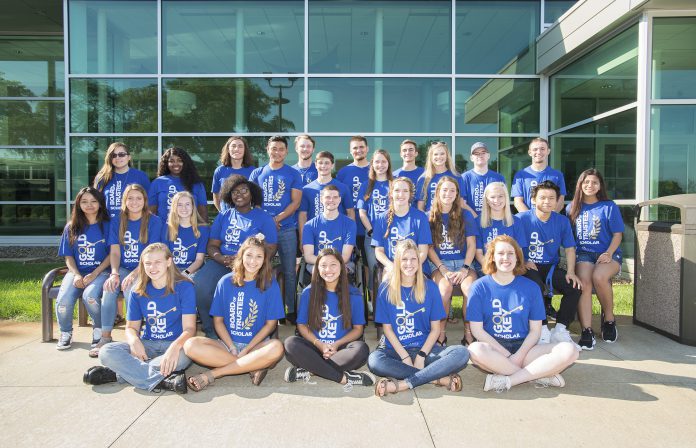
Future college students, where will you go next after high school? Are you unsure if you are interested in a community college or a four-year institution?
Choosing the right college can be overwhelming. Academics, cost, dorms, location, sports and student life are all the factors associated with this decision. As a student myself, I can say that students face many challenges when it comes to obtaining a college education. Attending a community college has been an enormous advantage towards my education.
I have been attending Kellogg Community College for the last three semesters. This college has provided me with accessibility, affordability and high-quality education. Based on my personal experience, community colleges are unique in higher education because they offer smaller classes, affordable tuition, flexible schedules, opportunities to explore major options and sometimes the campus is close to home.
About KCC
Kellogg Community College has a professional staff, a wide variety of student support services, and technological tools that pave the road toward the conquest of a quality education.
KCC was founded in 1956. They encourage students toward high standards of achievement and progress. According to the KCC website, KCC “offers 60 pre-professional transfer curricula; 37 associate degree programs; 25 certificate programs; seven categories of professional certifications; and a variety of short-term, non-credit courses” for students.
Kellogg Community College’s Director of Admissions Marko Delic said, “KCC offers opportunities for high school students (dual enrollment and early college), high school graduates, GED recipients, folks who stopped out due to personal or career reasons and wish to return to school, college graduates changing careers, lifelong learners and many more.”
This institution also allows students to transfer to another institution. At the end of this article, you will be able to find more information about the Michigan Transfer Agreement (MTA). For more information about Kellogg Community College, visit the website www.kellogg.edu.
Transfer Student Fadel Said
Fadel Said, 22, of Coldwater, transferred to Michigan State University after several years studying at KCC. Said’s current major is Advertising Management and Business Management. He said his community college experience was good and it was an easy transition from high school. When asked what differences he noticed between a community college and a university, he responded, “The difference is the population of the students. Universities have more population, and the size of campus is much larger.”
Said’s favorite things about a community college are “the size of the classrooms and how easy it is to get in contact with the professor, the price of courses.”
When asked how he would describe the college atmosphere in a community college, he said, “At a community college, it’s easier to get around. Students do not really like to make new friends, because everyone already has a group of friends they knew before. It’s easier to learn since classes are much smaller in size.”
Said did not face any challenges when he attended KCC. He said some challenges that he is experiencing in his university include getting around campus, the cost for classes and that it is harder to learn.
Said decided to attend a community college because he wanted to save money and experience the college environment. His advice to future college students is, “Be friendly, introduce yourself to new people. Ask for help whenever you need help. Also do not stress about school or the size of campus, just have fun and focus on school.”
Transfer Student Isayana Gallegos
Isayana Gallegos, 23, of Coldwater, transferred to Grand Valley State University after several years studying at KCC. Gallegos’ current major is Education with an emphasis on Early Childhood. She said her community college experience was “a very good transition from high school.”
When asked what differences she noticed between a community college and a university, she responded, “A community college is smaller in class size and one gets more one-on-one interaction with the professor, whereas a university is bigger in class size and you don’t really get the one-on-one interaction with the professor.”
Gallegos’ favorite thing about a community college is that she loves the flexibility of setting up her own schedule. When asked how she would describe the college atmosphere in a community college, she said, “The college atmosphere definitely kept me in my comfort zone for sure. The atmosphere felt like I was still in high school. I know based on my personal experience nothing changes, I was still at home, and in my same hometown.”
She did not face any challenges in her community college. She said some challenges she is facing in her university include remote learning and the cost of tuition.
Gallegos decided to attend a community college because it was closer to home, the cost of tuition was less and there was flexibility to balance work and school. Her advice to future college students is “to make sure they could get as many credits as they can because tuition is less expensive at a community college, and to always try to stay on top of everything as far as due dates and assignments because it is very easy to fall behind.”
Transfer Student Whitney Johnson
Whitney Johnson, 19, of Coldwater, transferred to KCC after several years studying at Saginaw Valley State University. Johnson’s current major is Business Management. She said her community college experience is “just sticking to schoolwork.”
Johnson decided to transfer to a community college after being part of a university.
“I figured out I didn’t care for the college I went to because it was too much like high school,” Johnson said.
When asked what differences she noticed between a community college and a university, she responded, “I find that community college is smaller, and the student body is not as united.”
Johnson’s favorite things about a community college are that it is “more self-paced, and the professors are not as strict.”
When asked how she would describe the college atmosphere in a community college, she said, “The atmosphere at community college is a lot more focused and people are rushing to get in and out.”
She said one of the challenges that she is experiencing in her community college is contacting professors. At a university, one of the challenges that she faced was trying to stay focused.
Johnson said she decided to attend a community college because it was less expensive. Her advice to future college students is, “Don’t get distracted, and try to make as many friends as possible!”
An Affordable Opportunity
Director of Admissions Marko Delic started his career at a community college.
“Having started as an international student, I also faced higher tuition rates; at the community college, those rates were affordable,” he said. “The transferability of courses allowed me to maximize these opportunities and spend more than two years at the community college, transfer all my credits and graduate with a bachelor’s degree just like all other university students.”
When asked what makes community colleges unique in higher education, Director Delic said, “I think the main difference is in the internalized label and reputation community colleges hold in the United States. In my experience being at a community college, I saved money, attended same-curriculum classes often taught by university professors, had the opportunity to work on campus, be a part of a student organization, go on trips, do research, volunteer for the school newspaper and so much more.”
When describing the college atmosphere, he said, “From my perspective, community colleges thrive on being a community first and then a college.”
His experience was different at a university.
“So many of the factors for student success (support, holistic programming, sense of belonging) began missing upon transfer, and it’s often up to student’s resilience to complete their journey,” Delic said. “Community college experience and network helped me build this resilience, but also the support I could use if nothing else worked out.”
Community College Benefits
There are many benefits to attending a community college. The tuition cost at other institutions can be overwhelming and highly unaffordable. Attending community college will help reduce the costs of a college education and avoid some student loan debt. Students might also avoid other expenses such as rent or utility expenses.
Community colleges also offer students associate degrees, which help students prepare for certain occupations or can be transferred to a four-year institution. Students can also pursue professional certifications.
At a community college, students can explore different classes or fields to determine if that is what he or she wants to pursue. Attending a community college is especially beneficial for recent high school graduates because there are less distractions, which allows students to focus more on academic and personal growth.
Community colleges are full of highly qualified, talented professors. Smaller classes allow students to have a deeper engagement with instructors. They also provide flexibility by offering classes at night and making it easy for students to transfer to another institution. They also provide the opportunity to balance school with wok and family or friends.
Director Delic said, “Between affordability, transferability of courses, the network and approachability of staff and faculty members, there is no reason why I would ever advise a student to start elsewhere.”
Community college can be a perfect choice for you depending on what you want and need.
Tips for a Successful Transfer
Director of Admissions Marko Delic suggests the following steps toward a successful transfer experience:
- Connect with the KCC Career and Employment Services office to take skills and personality assessments.
- Discuss with KCC Career Services the results of those assessments and how they align with you initial program interest.
- Meet with Academic Advising to discuss academic programs aligning with previous findings, as well as opportunities for transfer.
- Research programs and institutions that offer a bachelor’s degree (or higher) in your desired program.
- Connect with the institution’s (or multiple institutions’) transfer office/academic advisors to discuss your program of interest, transferring courses early.
- Repeat the steps above as necessary throughout your time at KCC.
One helpful resource for transfer students is the Michigan Transfer Network website at mitransfer.org, which allows visitors to compare course equivalencies among various colleges and universities within the state of Michigan.

























